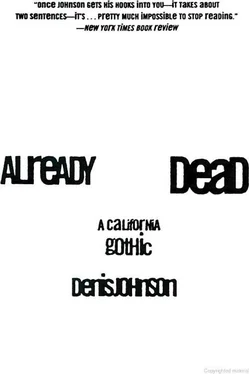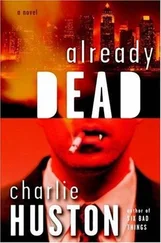I come and go, but this is decidedly not my home anymore. None of my stuff is here. In the bedroom Winona sleeps in a single bed now.
My office, a shed out by the barn, has been put to a better use, she says.
As a matter of fact spiders live in it.
There was a note from her, three weeks old, run through a nail on the house’s front door. Red’s got worms — feed store has the stuff — give him a full syringe —and I tore it off and put it to my lips and inhaled, trying to catch a whiff of the woman I’d married. A woman I’d loved then.
But that woman was gone. A man told me — this in the Gualala Hotel bar one night — that if I were only older, I’d have seen by now that people pass through ages, and I’d have learned that when they’ve changed and been lost, you find them again somewhere in the next age.
But later that night this same man got mean under the liquor and had to be restrained. He lunged at me, raving — the meaty arms of salmon-mongers and the greasy hands of big-rig operators yanking him back.
Eyes fixed , he gave meaning to that old phrase in his truly psychotic, really animal state. His eyeballs scorched and chilled me across space.
He raised blisters and goose bumps, even through the window, as I stomped off the hotel’s wooden porch into the dark. So much for the wisdom of our counselors. That madman wasn’t going to help me find Winona, not in her current age or any other. Don’t ask me who this woman is, walking around in my wife’s body with a decisive air.
I woke up in the bed I didn’t belong in, woke up smelling my wife, but it wasn’t the same smell I remembered. I stood by the railing upstairs and marked how much the place had changed since the last time I’d spent a night here. My hands shook this morning. I’d slept in my clothes.
My foreignness overwhelmed me. Only the thought of leaving right away held any cheer. I decided to take Winona’s old pickup and get coffee in town.
38 / Denis Johnson
The ridge road parallels the coast for dozens of miles, wagging down into draws and crossing creeks and climbing out again. This isn’t the Coast Highway, but a much narrower route, better suited to my kind of car and my kind of driving, but not so well to Winona’s looming Dodge. No shoulder, the trees crowd right against it. Ordinary, happy people live along here in nice houses you can’t see from the road. Often they report me for speeding past. I sense them back in those woods tending to their animals and their gardens. For them the darker alleys of thought have been clearly marked at the entrances. Everything’s fine, maybe a little guano has to be cleaned from the left boot, something dropped by one of their innumerable geese. Sun-shot California mist in the morning. A stirring of wind chimes, their cats rolling on their sides and stretching in the ripe greenness while New Age Muzak, what I call Electronic Obvious, sprinkles down over everything. My good neighbors. When I hear my good neighbors at the drugstore talking about pamphlets from the Government Printing Office, pamphlets about horticulture, free pamphlets — I want to kill them. I suppose we all feel that way sometimes. We all who? Ah, we who probably should be hunted down and jailed I suppose.
But today no chats in the pharmacy. Today I stop at the feed store for one bale each of oat hay and alfalfa. Since she was a child my wife Winona has kept a red horse named Red. Red is more than twenty-five years old now. He does nothing but conjugate hay and consult with the large-animal vet about his stomach ailments. And hadn’t there been a note? Something about medicine? In my shirt pocket I found it: Red had worms.
I ran into one of Winona’s friends. “Hel- lo .” It was Yvonne.
“Yvonne! Hi! I’m getting some stuff,” I said, talking more than I wanted, as I always do to people I don’t like.
“Nelson, how are you?”
“Fine! Great! Getting some birdseed?” I said for no reason at all.
She held up a small cardboard box. “These are white rats.” In our part of the world people may do, say, or become whatever they feel like without apologizing. And tomorrow its opposite.
“White ones, are they?”
“I haven’t seen you since you and Winona split up. How is that working for you?”
“Working?”
Already Dead / 39
“How is that working for you?”
“How is the breakdown proceeding? How is the malfunction functioning? Briefly, I’m confused and sad and pissed off.”
“The restructuring of the relationship,” she said, not without humor.
She reached out and squeezed my hand. Imagining herself some kind of healer probably.
“Well, see you.”
“See you.”
I went inside without looking back.
“Yvonne bought two rats,” the lady behind the counter told me.
“Why do you sell rats?”
“She buys small animals but never buys cages. Does she let them go?”
“Who knows. Who cares?”
“Some people feed hamsters and things to snakes.”
“And is that why you have hamsters and things at a feed store?”
“Well, I don’t know. It’s not my store.”
“It’s not my store either.”
“Didn’t I see you selling fruit the other day?”
“Anything’s possible.”
“You were drunk, and you were selling fruit.”
“I was just helping the guy out. We got to talking and I — you know.”
“I always get my fruit at the fruit stand. It’s better than the store.
Cheaper.”
“I don’t want to talk about fruit, actually.” Or anything else with you, Feed Store Lady. I’d known her for years — long red hair and glazed blue eyes, possessor of a marshmallowy intellect. Chipper, coping, as in the early stages of some unbelievable catastrophe. She’d emigrated from Los Angeles so long ago that by now she’d be an imbecile in its streets. She barely managed among a few bales of hay. “I need wormer,” I told her.
“Oh,” she said sympathetically, “Red’s sick?” Sick? The animal’s been teetering at the grave’s edge for years. His mistress gives him enemas regularly, cooing. His master’s in the feed store with the staggers and jags, standing before you as the fibers of his reality tear loose. “The wormer’s for me,” I said. She laughed. We in California show anger and pleasure the same way, by a little 40 / Denis Johnson
California laugh. You need an ear for the difference. And things aren’t
“good,” and things are never “bad”—no, in this lush eternity by the sea we measure our moments by two other words. Everything on the spectrum of undesirability, from minor annoyance to universal tragedy, is okay . Anything better to any degree, all the way up to a colossal lottery jackpot or the return of Jesus — that’s neat .
“This’ll get those critters,” she said, handing me Red’s medicine in a little white sack. “Can you get the hay on board yourself?”
“You bet.” Another most useful rural California phrase.
Outside I saw the two strangers who’d been looking for me, probably to kill me, and that was okay. Then they passed by in their big camper.
They headed south, they didn’t find me, not this time. And that was neat.
Not a half hour later I was having a sort of breakfast five miles north, in Anchor Bay. It wasn’t that pleasant. Too much cinnamon in the apple pie, and now the cook had spilled chemical cleanser on the griddle and we were all asphyxiating swiftly here in the Full Sails Cafe.
The patrolman from Point Arena, a new man to our part of the coast, had already been making me nervous, sitting in full uniform at the counter and spying on the restaurant’s gangly brunette waitress, looking bored and hopeful of making an arrest. “I really would like to get a date with you,” he told the waitress.
Читать дальше












